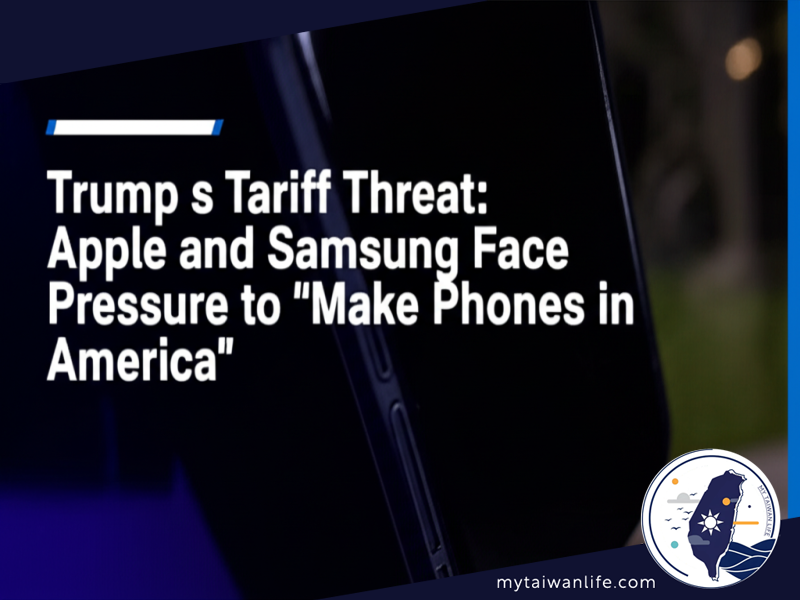Trump's Tariff Threat: Apple and Samsung Face Pressure to "Make Phones in America"
The former President demands domestic production, sparking debate about costs and feasibility.

Former President Donald Trump has issued a strong directive to Apple and other smartphone manufacturers, including Samsung, demanding they manufacture their devices within the United States or face a 25% tariff. This announcement, made on Friday, has reignited the debate over domestic production and its economic implications for major tech companies.
“I have long ago informed Tim Cook of Apple that I expect their iPhone’s that will be sold in the United States of America will be manufactured and built in the United States, not India, or anyplace else,” Trump posted on Truth Social. Speaking to the press, he clarified that the proposed tariff would apply to all phone makers selling in the US.
This isn't the first time Trump has voiced his concerns. During a Middle East trip last week, he expressed his displeasure with Apple CEO Tim Cook's plan to manufacture iPhones in India. Apple has been diversifying its production over the past several years, with some iPhone production already shifted to India. Cook stated that he expects "the majority of iPhones sold in the US will have India as their country of origin."
In a previous earnings call, Cook said he expected Apple would face a tariff burden of up to $900 million this quarter. However, Apple and other US tech companies scored a big win last month when Trump exempted electronics from his massive tariffs on China.
Samsung, unlike Apple, doesn't rely on China for smartphone production, closing its last phone factory there in 2019. Sources within Samsung state the majority of its manufacturing occurs in South Korea, Vietnam, India and Brazil.
Treasury Secretary Scott Bessent, in an interview with Fox News, stated that Trump aims to "bring back precision manufacturing to the US," highlighting concerns about external production, particularly of semiconductors. Bessent emphasized the importance of securing the semiconductor supply chain.
Apple has already been investing in US-based production, with a partnership with TSMC, which recently opened a chipmaking plant in Arizona. However, moving a significant portion of iPhone production to the US presents substantial challenges.
Experts like Dan Ives, global head of technology research at Wedbush Securities, consider reshoring iPhone production a "fictional tale," due to the complex global supply chain and the current cost. He estimates that US-made iPhones could cost significantly more, and the shift would take years and billions of dollars. Gene Munster, managing partner at Deepwater Asset Management, believes tariffs of 30% or higher would likely force Apple to raise prices.
Despite these challenges, Apple has announced a $500 billion investment to expand its US facilities, including a new facility in Houston to produce servers, and expanded data center capacity.
Other Versions
La amenaza arancelaria de Trump: Apple y Samsung se enfrentan a presiones para "fabricar teléfonos en Estados Unidos"
La menace des tarifs douaniers de Trump : Apple et Samsung font face à des pressions pour fabriquer des téléphones en Amérique ;
Ancaman Tarif Trump: Apple dan Samsung Menghadapi Tekanan untuk Membuat Ponsel di Amerika;
La minaccia di Trump sui dazi: Apple e Samsung sono sotto pressione per produrre telefoni in America"
トランプの関税脅威:アップルとサムスンはアメリカで携帯電話を作れという圧力に直面している;
트럼프의 관세 위협: 애플과 삼성, '미국에서 휴대폰을 생산하라'는 압력에 직면하다;
Banta sa Taripa ni Trump: Apple at Samsung, Haharap sa Presyur na "Gumawa ng Telepono sa Amerika"
Тарифная угроза Трампа: Apple и Samsung вынуждают "производить телефоны в Америке"
ภัยคุกคามด้านภาษีของทรัมป์: Apple และ Samsung เผชิญแรงกดดันให้ "ผลิตโทรศัพท์ในอเมริกา"
Đe dọa thuế quan của Trump: Apple và Samsung đối mặt áp lực "Sản xuất điện thoại ở Mỹ"

